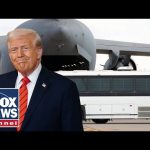President Donald Trump’s sweeping new tariff policies have ignited a firestorm of debate, both domestically and internationally, as the administration doubles down on its “America First” economic strategy. Declaring a national emergency under the International Emergency Economic Powers Act (IEEPA), Trump has imposed a universal 10% tariff on all imports, with additional steep tariffs targeting countries like China, which now faces an effective 54% duty on its goods. These measures, aimed at addressing the persistent U.S. trade deficit and revitalizing domestic manufacturing, mark one of the most significant shifts in American trade policy since the 1930s. While supporters hail this as a bold move to protect American sovereignty and industry, critics warn of severe economic fallout.
The administration’s unapologetic stance has sent shockwaves through global markets. The Dow Jones Industrial Average has plunged over 2,000 points in recent days, with the S&P 500 nearing bear market territory. Economists caution that these tariffs could raise consumer prices, disrupt supply chains, and potentially push the U.S. toward recession. Despite these warnings, Trump remains steadfast, arguing that short-term pain will yield long-term gains by forcing trading partners to negotiate fairer deals. The White House has framed these tariffs as necessary to stop foreign nations from exploiting America’s economic strength while undermining its industrial base.
Domestically, the policy has exposed fractures within the Republican Party. While House Speaker Mike Johnson has pledged to give Trump the “space” needed to execute his strategy, some GOP lawmakers are pushing back. Senators Chuck Grassley and Maria Cantwell have introduced bipartisan legislation seeking to reclaim congressional oversight over tariff decisions—a move Trump has vowed to veto. This intra-party conflict underscores broader concerns about executive overreach and the balance of power in trade policymaking. Nonetheless, many conservatives argue that Trump’s approach is a long-overdue correction to decades of globalist trade policies that hollowed out American industries.
Internationally, retaliation from major trading partners has been swift and severe. China has imposed a 34% tariff on all U.S. goods, while other nations are considering similar measures. These actions threaten to escalate into a full-blown trade war that could destabilize global markets further. However, Trump’s allies contend that his hardline tactics are already yielding results, with multiple countries reportedly seeking negotiations to avoid prolonged economic conflict. For many supporters, this willingness to confront unfair trade practices head-on is seen as a demonstration of strength and resolve.
As this high-stakes economic battle unfolds, one thing is clear: President Trump is reshaping America’s role in global trade with an iron fist. While critics decry the potential costs of these policies, supporters argue that they are necessary to restore America’s competitive edge and protect its sovereignty in an increasingly hostile global economy. Whether this gamble pays off remains uncertain, but it undeniably signals a new era of unapologetic economic nationalism that prioritizes American interests above all else.




